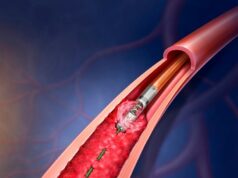
Shockwave Medical has reported positive results from the DISRUPT BTK Study, which were presented at the annual Cardiovascular and Interventional Radiological Society of Europe congress (CIRSE; 16-20 September, Copenhagen, Denmark).
“The results of this study are consistent with findings from previous studies of Lithoplasty, showing a low rate of residual stenosis with minimal complications in a predominantly critical limb ischaemic patient population,” said Marianne Brodmann, of the Medical University of Graz, Austria. “These results suggest that the Lithoplasty treatment has the potential to address challenges that calcified stenosis pose below the knee, where calcium is more prevalent and different than above the knee. It can occur deeper in the artery wall, making these lesions more difficult to treat. Treatment failure can pose heightened risks for patients with critical limb ischaemia, including higher risks of amputation and death.”
DISRUPT BTK, a prospective single arm study, evaluated the use of the Shockwave Medical Lithoplasty system as a treatment for peripheral artery disease (PAD) patients with calcified lesions in arteries below the knee. The study enrolled 20 patients at three sites in Europe and New Zealand.
The study enrolled patients with moderate or severe calcified lesions in below-the-knee arteries, including 80% of patients who were classified as having critical limb ischaemia. Acute performance results showed low residual stenosis (27%) with low vascular complications, including no perforations, distal embolisation, reflow complications or abrupt closure and only one grade B dissection. There were no major adverse events including death, myocardial infarction, target limb revascularisation or amputation through 30 days.
The Lithoplasty system is designed to treat calcified leg artery blockages with lithotripsy, sonic pressure waves historically used to treat patients with kidney stones. The technology is now commercially available in both the USA and Europe for the treatment of calcified plaque in peripheral arteries.
“Interventional procedures that involve moderate and severe calcium can be complex, unpredictable and costly. The previous DISRUPT PAD Study demonstrated that Lithoplasty addresses many major concerns in the treatment of problematic calcium in femoral and popliteal artery lesions, achieving a high acute gain in vessel diameter with minimal dissections, embolisation, perforation or recoil,” said Doug Godshall, CEO of Shockwave Medical. “DISRUPT BTK now gives clinicians encouraging data in a high-risk patient population where calcific lesions pose different treatment challenges including the potential for limb loss.”













